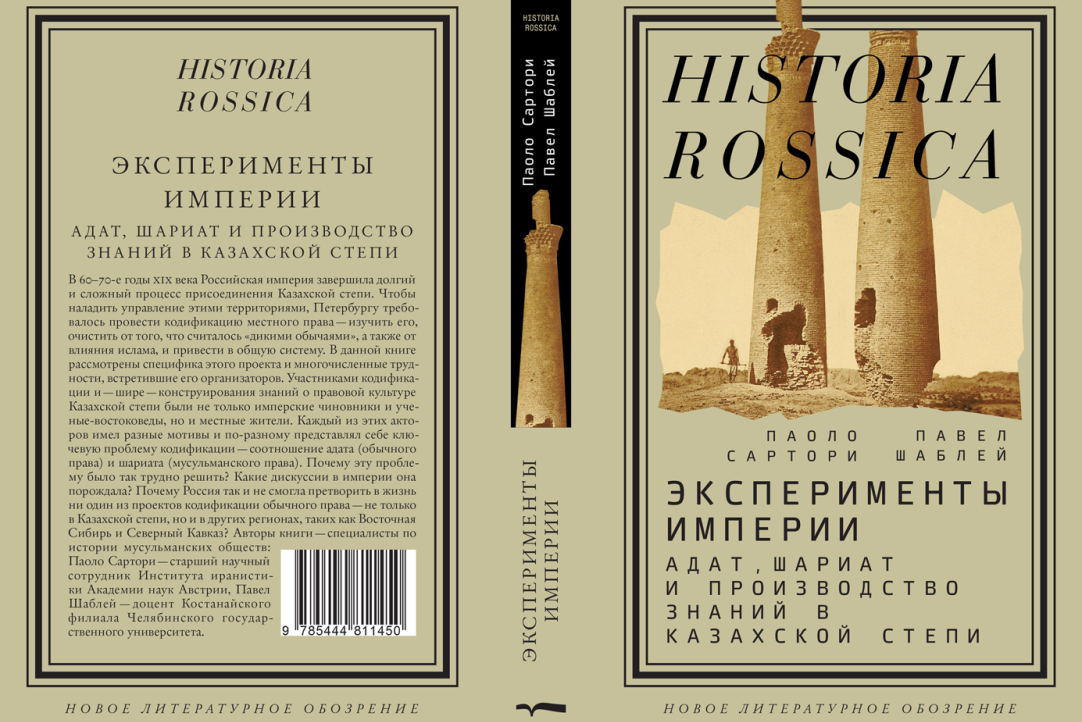"Boundaries of History," Ab Imperio Award 2019: Pavel Shabley on adat and sharia in the Orenburg Border Commission in the middle of the 19th century
Pavel Shabley (Kostanay branch of Chelyabinsk State University), whose joint book "Experiments of the Empire: Adat, Sharia and the Production of Knowledge in the Kazakh Steppe" with Paolo Sartori was noticed by Ab Imperio 2019 award, made a report "Adat vs Sharia in the Orenburg Border Commission: J.Y. Osmolovsky and Kazakh legal culture in the middle of the XIX century" at the seminar "Boundaries of History."

Much research has already been written about the Russian Empire and Central Asia. Historiography has provided us with many studies on Islam, local customary law or separate regions such as Kazakhstan or the Orenburg region. The classic colonial-national narrative about adat and Islam in these regions almost always has been arising in the form of the idea of their inevitable replacement by the legal norms of the Russian Empire. Homogeneous expert knowledge about local customs and legal practices was perceived as a tool in the hands of the empire's officials to transform and even eradicate them. However, it is precisely this narrative that undergoes a certain revision.
In 2011, the Collection of Kazakh customary law was discovered, compiled, among others, by an official of the Orenburg border commission J.Y. Osmolovsky in the middle of the 19th century, which was a vivid example of a departure from the paradigm described above. He noticed the importance of the influence of the Sharia on the customary law of the Kazakh steppe, and instead of eliminating this influence and unifying the legislation with other imperial territories, he proposed inclusion of it in the governance of the steppe, for instance, introducing an official biy’s court. This Osmolovsky’s reasoning coincided with the post-reform request of the imperial authorities for the help of expert orientalist knowledge to integrate the political and legal space of the empire, however, Osmolovsky did not receive unanimous support.
The authors reconstruct the history of how V.V. Grigoriev, the future famous orientalist and another official of the Commission, in 1857 encountered Osmolovsky's collection. In fact, committing a malfeasance, he seized this documentation and personally took up the editing of Kazakh customary law, trying to cope with the Islamic element in the legislation. At the same time, the local administration was not always willing to accept various projects proposed by experts, which is also well confirmed by the example of Grigoriev. Thus, the policy of the Russian Empire in Central Asia was very contradictory. In addition to the fact that the Orientalists and their knowledge often undermined the practices of colonial governance and the study of the steppe, the very knowledge itself seems to be virtually very discrete.
The functioning of this discrete and multi-vector space of administration practices and expert knowledge was presented by the authors within the framework of the concept of legal hybridity, which is characterized by the ability of different actors to maneuver in protecting their interests or governing the steppe. Consideration of the reaction of the local population of the steppe to the proposed new forms of legal codification, for example, showed that the new codexes of customary law were not supported by local elites and the population, the latter, moreover, did not even grasp the influence of Sharia in their legal practices, knowledge of which was passed down to them by imperial Orientalists. Nevertheless, all this created conditions for the functioning of multiple institutions and practices, which in different circumstances could be used by both the local population and the administration.
It is legal hybridity that allows us to look globally at the problem of interaction of imperial formations with differentiated local experience. The authors highlighted the experience of the codification of customary law in French Algeria, as well as the Dutch governance of Muslim communities in Indonesia. These cases were able to show how the framework of legal hybridity made it possible to quickly and flexibly change and apply various tactics and approaches in management, maintain group loyalty, and much more.
Announcement
